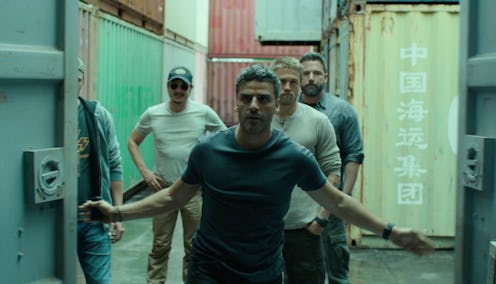Entertainment
Oscar Isaac & Ben Affleck Actually Trained Like Special Forces For Their New Netflix Movie
Netflix's new original action film Triple Frontier, out Mar. 13, follows five military veterans left adrift and broke after serving their country. Determined, the friends decide to use their training to rob one of South America's drug kingpins. With attention to detail and depiction of training in use, is Triple Frontier based on a true story? The plot might not be, but the smaller gestures and moments come from a real place.
Part heist movie, part military (or more exactly, post-military) drama, Triple Frontier's got plenty of action, but hinges on the issues of men feeling betrayed on a larger scale. Ben Affleck, Oscar Isaac, Charlie Hunnam, Pedro Pascal, and Garret Hedlund play the crew, who in the face of their dangerous plan quickly unraveling begin to question each other. In the past, their unimpeachable mutual trust is what kept them alive, but now, all sorts of cracks are beginning to show.
Triple Frontier has taken over a decade to make its way to screen. IndieWire reports that around 2005, when director Kathryn Bigelow and Triple Frontier writer Mark Boal were working on the set of what would eventually be The Hurt Locker, the two thought up another large-scale, big-budget story, this one set in the notoriously criminal border region between Argentina, Paraguay, and Brazil known as "la triple frontera." The film was originally titled Sleeping Dogs. In 2012 The Hollywood Reporter reported that Boal and Bigelow were still attached, with Bigelow wanting Tom Hanks to star, though the studio pushed for her to consider Will Smith. Ultimately the studio didn't want to take on the $80 million estimated price tag of the film, Hanks and Bigelow dropped out and moved on, a host of potential actors came and went, but Boal remained on the project.
According to The Times UK, Boal's 2004 troop embedment with bomb diffusers in Iraq was the inspiration for The Hurt Locker. Hollywood Reporter notes in 2009, Boal went to serve in Iraq, and while he hasn't specifically said so, it seems likely his personal time served informed the script's realistic touches about life as a vet. The actors had plenty of on-set help to get into character as former special ops.
"That was for me the most interesting, exciting part about it, is getting to hear the stories of the real guys — the guys that lived this life that sacrificed so much for the country and getting to work with them, particularly Nick John and Kevin Vance," said Isaac in a video roundtable for IGN.
Speaking with BlackFilm, Isaac expanded on the experts who worked on the film. "We met Kevin Vance and Nick John, who are these incredible Special Forces Advisors," he said. "Nick John was with us every step of the way building our confidence and helping us take these things seriously and focus on what really matters; not necessarily how many push-ups we can do but how to think in a tactical way. By the end of the day, they gave us live ammunition and trusted us with that." Pascal added, "There was a lot of testosterone in the film."
Speaking to Fox DC, Hunnam recalled asking one of the consultants to help explain his own character's nickname. "We were given the opportunity to work with some guys who'd worked at a high level, Special Forces, SEAL team, a Delta Force guy...I said to him, 'How would you get yourself a nickname like Ironhead?" And he said, 'Well, you've probably been shot in the head and you got some lead in your head, but Ironhead sounds better than Leadhead, you know?'"
Though there's no real heist that specifically inspired the film, it's the realism of the film's location shooting and actors' collaboration with operators who've really been on the ground that give the film a gritty, authentic quality in the face of Hollywood-style action.
